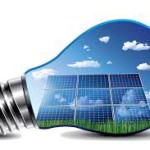Below are some common questions about solar energy systems. I have provided a basis for this blog. What I really would like to hear about is all these free solar systems that people are financing. Do you think financing solar is worth it and does the payback really make any sense? Are the companies who are locking people into these long term contracts telling them everything they need to know?
Can solar run a refrigerator, microwave, freezer or washing machine?
Yes. These appliances can take many watt-hours but only a few hundred watts. You can purchase high efficiency refrigerators, microwaves, and washing machine motors to minimize their energy use and benefit more from your solar system.
Can solar run a hot water heater or heating & cooling system?
For houses a more cost effective solution is to use another energy source for these items. Electric resistance heating such as an electric dryer is the most expensive way to dry clothes, heat water or heat your home. It is much cheaper to either use gas or propane dryers and heaters. If you would rather not burn fossil fuels you could also use a solar hot water heater. Remember solar can be even more effective if it is supplying an already energy efficient home.
What is a free solar system? Does financing make sense?
We provide only immediate turnkey solutions custom to our customer needs. The old saying you get what you pay for. Be careful what you lock yourself into and understand a locked in rate does not fluctuate on the basis of a homeowner becoming more energy efficient. You pay on the basis of what free systems produce, NOT on the amount of energy you use. These systems are not for customers that are interested in electrical independence or being completely off the grid and raise a complexity of confusing contracts much like cell phones did in the mid 90s.
The average home will use less and less energy over time and your electric company could lower their rates to compete with these type of contracts making the customer with free solar worse off. Ask yourself when was the last time your electric company locked you into several years of payments or asked if they could build a power plant on your roof and not let you own it. If free solar is offered why doesn’t anyone offer free air conditioners or free cars?
Free solar is a very large financial risk very much on the edge of scam and contracts do not address specific customer needs. Through calculations and scenarios we offer our customers the education they need to understand what they are doing before they sign contracts like these. We highly recommend you apply for a loan. You will be much better off if you own your managed energy system and we are working closely with several banks to move them towards green energy loans. We hope that this buzz starts to fade as we are concerned about the future of going green. Unfortunately nothing is free and many deals are too good to be true. Here is a very well written article and another perspective about free solar. What is a free solar system?
If solar generates 1 kW, how do I run a 1.5 kW toaster?
The power you can draw does not depend on the power being generated by the panels. It depends on how much power you have in your batteries and the size of your inverter. If you have a 4 kilowatt inverter and 16 kilowatt hours of battery storage, you can run 4000 watts of appliances all at once. If you have a net metering PV system, then you can use solar electricity and utility power all at the same time.
What about solar in cloudy weather or at night time?
Solar panels are very efficient and will produce power even in cloudy weather. However, to improve any losses you can store electricity in batteries and size a system to be able to collect enough energy to fully charge the batteries when there is sun. This means that solar power will work just as well in Buffalo, NY as in Dallas, TX. The only difference is that the number of panels you need in Buffalo is greater than the number you would need in Dallas, because Buffalo receives 65% of the amount of sun that Dallas does.
Which direction do you point a solar array?
Although there are many techniques for installing solar on west and east roofs. South facing, flat roofs and poles are preferable. The most southern facing part of your home or business as possible with the least amount of obstructions as possible (such as trees or a chimney). In some cases this is not always possible and sometimes can be the determining factor of whether or not you should install solar. Shading is the last thing you want on your solar investment.
How much does solar electricity cost?
Buyer beware, don’t be fooled by unqualified electricians and contractors or very large corporations offering free solar systems. Most of their training is very minimal with no guarantees. Low quality solar installations can decrease your solar efficiency by more than 50%! Imagine 50% of your investment completely lost. Dexa Engineering is in the business to save you money and allow you to recoup your investment as quickly as possible. We work closely with manufacturers and distributors every day to offer you the best price for your solar system. Honesty and customer service is our number one goal.
Look at solar as a long term investment and the same type of investment as buying a new car. The only difference is you make money on solar and lose money the second you drive a new car off the lot. Most small systems will range from $8,000-$70,000 and larger pole mounted arrays from $70,000-$500,000. For most it will take about 10 years to make back your investment if the current rates of electricity stay the same. However, with rising electricity costs you could see even faster returns on your solar investment.
Why do we need a custom quote?
Every home or business usually calls for a custom solar engineering design. Homes in Dallas may be improperly situated, tend to have very unique roofs, or could be heavily shaded. After seeing your home we can recommend different ways to install the solar array. Some businesses use equipment that consume large amounts of electricity. Solar system benefits depend on the system design and electricity usage.
Generally the best candidates are large open unobstructed roofs facing south, businesses with flat roofs, lots of land, a renewable home design built from scratch, farms and ranches. Without a full site assessment a solar system will most likely be designed and installed incorrectly.
Is Texas allowing net metering?
Taken directly out of the distributed generation interconnection manual prepared by the U.S. Department of Energy:
Texas Public Utility Regulatory Act (PURA) of 1999 included in the list of customer rights and safeguards that a customer is entitled to have access to on-site distributed generation [39.101(b)(3)]. This provision led the Public Utility Commission of Texas in October 1999 to adopt Substantive Rules 25.211 and 25.212 addressing the technical and procedural aspects of interconnecting distributed generation, developed through a collaborative process among the members of the TDU and DG communities. This manual also includes the more recently adopted rules on operational aspects and environmental treatment of distributed resources.
The Public Utility Commission of Texas wants to encourage the use of distributed resources. Distributed resources benefit the state by adding more competitive options, potentially reducing customer energy, improving the asset utilization of TDU distribution systems, firming up reliability, and improving customers power quality.
Texans have the right to use distributed resources for whatever purpose they feel is beneficial and it is the responsibility of the local distribution utilities to accommodate and interconnect distributed generation subject to the rules laid out in the interconnection manual.
Public Utility Commission of Texas DG Interconnection Manual 5/01/02

